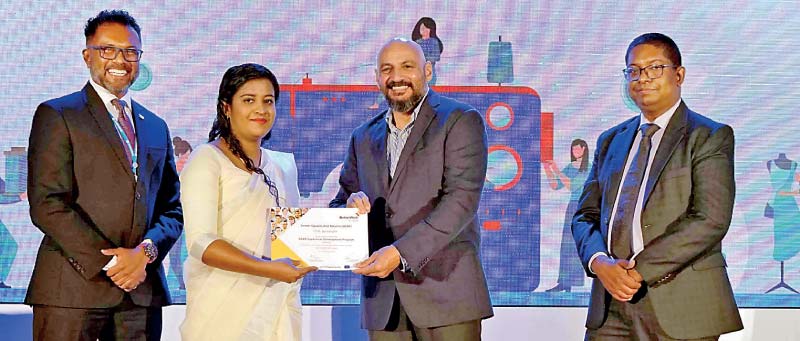Wednesday Feb 25, 2026
Wednesday Feb 25, 2026
Monday, 23 December 2024 00:00 - - {{hitsCtrl.values.hits}}

GEAR Graduation 2024

GEAR class of 2024
Sri Lanka’s apparel sector, a driver of the nation’s economy, celebrated a pivotal moment in advancing gender equality with the graduation of the 2024 cohort from the Gender Equality and Returns (GEAR) program recently. Over 80% of the apparel workforce in Sri Lanka comprises women, yet they remain significantly underrepresented in leadership roles. The GEAR is a flagship initiative of the Better Work Sri Lanka program which aims to address these leadership gaps by equipping women with skills to advance into supervisory and managerial roles. Better Work Sri Lanka is a joint initiative of the International Labour Organization (ILO) and the International Finance Corporation (IFC) supported by the European Union (EU), and Levis Strauss Foundation.
This year, 102 female trainees from leading factories, including Brandix Lanka, Courtaulds Clothing Lanka and Hirdaramani Apparel marked their journey of transformation. There were 81 trainees who moved from team member to supervisor and while another 21 trainees went from supervisor to executive. Since its pilot phase in Sri Lanka, the GEAR program has facilitated remarkable progress, with over 84% of participants earning promotions and production lines led by GEAR-trained supervisors reporting measurable improvement of +5.00% increase in efficiency.
In addition to machine operators been promoted as supervisors, this graduation included: Supervisors to executives/ middle managers and 30 Master Trainers under the ToT program.
The GEAR program offers a comprehensive approach that blends technical training, leadership development, on-the-job coaching, and collaboration between factory management and workers. By addressing entrenched gender biases and fostering inclusive workplace cultures, the program has become a catalyst for systemic change. The program’s success reflects the commitment of industry leaders to identifying, nurturing, and retaining female talent in Sri Lanka’s garment industry.
“Representation matters, especially at the grassroots level, where women are significantly underrepresented,” said Better Work Sri Lanka program Head Kesava Murali Kanapathy. “GEAR is a transformative journey, fostering inclusivity, leadership, and operational excellence. It is inspiring to see graduates poised to become agents of change in the apparel sector.”
The 2024 graduation ceremony, held in Colombo in December, served as a celebration and a platform for discourse. Industry stakeholders, including representatives from the Joint Apparel Association Forum, Employers’ Federation of Ceylon, and various factory managers, participated in discussions on GEAR’s impact and future strategies for expanding its reach.
EU Delegation to Sri Lanka Head of Cooperation Johann Hesse praised the program’s accomplishments, saying, “It is inspiring to witness tangible actions promoting gender equality. These graduates showcase what can be achieved when efforts converge to foster inclusive growth and empower women to thrive as leaders.”
GEAR is part of a broader global initiative by IFC and ILO to advance labour standards, enhance gender equality, and drive sustainable growth in manufacturing sectors. Since its inception, the program has delivered results across Vietnam, Bangladesh, Madagascar, and Cambodia. The factories in Sri Lanka participating in GEAR supply to global brands, amplifying the program’s impact on a global scale.
Yohan Lawrence of JAAF, commenting on the graduation of yet another batch said Sri Lanka’s apparel sector, a major global export contributor, must tap into the potential of female leadership for sustainable growth and programs like GEAR are logical and necessary investments in the industry’s future. He further underscored the dual benefits of the program by saying, “GEAR not only builds skills and inspires ambition among women workers but also helps factories create environments that encourage inclusion, reduce gender biases, and improve employee retention — even during industry challenges.”
The graduation of the 2024 class reaffirms the transformative power of initiatives like GEAR in bridging gender gaps, empowering women, and steering Sri Lanka’s apparel sector toward a more equitable future.